Table of Contents
ANTONIO CARLOS “TOM” JOBIM – TRISTE (Guitar arr. TAB SHEET MUSIC, partitura)
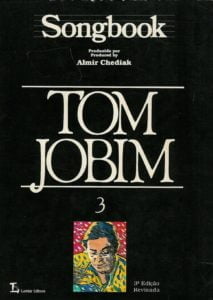
Lyrics:
Triste é viver na solidão
Na dor cruel de uma paixão
Triste é saber que ninguém
Pode viver de ilusão
Que nunca vai ser nunca vai dar
O sonhador tem que acordar
Tua beleza é um avião
Demais p’rum pobre coração
Que pára pra te ver passar
Só pra me maltratar
Triste é viver na solidão
Best Sheet Music download from our Library.
‘Triste’ (meaning ‘Sad’ in English) is a bossa nova song composed in 1966 by Antônio Carlos Jobim, who also wrote the lyrics in English and Portuguese.
Background
Jobim wrote the song in late 1966 while staying at the Sunset Marquis Hotel in Los Angeles, while waiting for Frank Sinatra to return from a vacation in Barbados to begin recording his album Francis Albert Sinatra & Antônio Carlos Jobim (1967).
The first recording of the song was an instrumental version by Jobim for his 1967 Wave album. Sinatra recorded it with Jobim two years later in the sessions for his planned second album, SinatraJobim, which was eventually released as Sinatra & Company’s Side A (1971).
Jobim recorded an English vocal version in 1980 on the album Terra Brasilis.
Antonio Carlos Jobim
Antônio Carlos Brasileiro de Almeida Jobim (January 25, 1927 – December 8, 1994), also known as Tom Jobim was a Brazilian composer, pianist, composer, arranger, and singer. Considered one of the great exponents of Brazilian music, Jobim internationalized bossa nova and, with the help of leading American artists, fused it with jazz in the 1960s to create a new sound with popular success. As such, he is sometimes referred to as the ‘father of bossa nova’.
Jobim was a major force behind the creation of the bossa nova style, and his songs have been performed by many singers and instrumentalists internationally.
Please, subscribe to our Library.
If you are already a subscriber, please, check our NEW SCORES’ page every month for new sheet music. THANK YOU!
In 1965, the Getz/Gilberto album was the first jazz record to win the Grammy Award for Album of the Year. It also won for Best Jazz Instrumental Album – Individual or Group and for Best Engineered Album, Non-Classical. The album’s single ‘Garota de Ipanema’ (‘The Girl from Ipanema’), one of the most recorded songs of all time, won Record of the Year.
Jobim composed many songs that are now included in the standard jazz and pop repertoires. The song ‘Garota de Ipanema’ has been recorded more than 240 times by other artists.
His 1967 album with Frank Sinatra, Francis Albert Sinatra and Antônio Carlos Jobim, was nominated for Album of the Year in 1968.
Antônio Carlos Jobim was born in the middle-class district of Tijuca in Rio de Janeiro. His father, Jorge de Oliveira Jobim (São Gabriel, Rio Grande do Sul; 1889-1935), was a writer, diplomat, teacher and journalist.
He came from a prominent family, being the great-nephew of José Martins da Cruz Jobim, a senator, private councilor, and physician to Emperor Dom Pedro II. While studying medicine in Europe, José Martins added Jobim to his surname, paying homage to the town his family came from in Portugal, the parish of Santa Cruz de Jovim, Porto.
His mother, Nilza Brasileiro de Almeida (c. 1910-1989), was of partially indigenous descent from northeastern Brazil.
When Antônio was still a baby, his parents separated and his mother moved with her children (Antônio Carlos and his sister Helena Isaura, born February 23, 1931) to Ipanema, the beachside neighborhood that the composer would later would celebrate in their songs.
In 1935, when Jobim’s elder died, Nilza married Celso da Frota Pessoa (died February 2, 1979), who would encourage the career of her stepson. It was he who gave Jobim his first piano. As a young man of impoverished youth, Jobim made a living playing in nightclubs and bars and later as an arranger for a record label before beginning to achieve success as a songwriter.
Musical influences
Jobim’s musical roots were planted firmly in the work of Pixinguinha, the legendary musician and composer who pioneered modern Brazilian music in the 1930s. His teachers included Lúcia Branco and, beginning in 1941, Hans-Joachim Koellreutter, a German composer who lived in Brazil and introduced atonal and twelve-tone composition in the country.
Jobim was also influenced by French composers Claude Debussy and Maurice Ravel, and by Brazilian composers Ary Barroso and Heitor Villa-Lobos, who has been described as ‘Jobim’s most important musical influence’.
Among many topics, his lyrics talked about love, self-discovery, betrayal, joy, and especially about birds and the natural wonders of Brazil, such as the ‘Mata Atlântica’ forest, characters from Brazilian folklore, and his native city of Rio de Janeiro.
In the 1940s, Tom Jobim began playing the piano in bars and nightclubs in Rio de Janeiro, and in the early 1950s, he worked as an arranger at the Continental Studio, where he recorded his first composition, in April 1953, when Brazilian singer Mauricy Moura recorded Incerteza, a Tom Jobim composition with lyrics by Newton Mendonça.
Jobim rose to prominence in Brazil when he teamed up with poet and diplomat Vinicius de Moraes to write the music for the play Orfeu da Conceição (1956).
The most popular song on the show was ‘Se Todos Fossem Iguais A Você’ (‘If Everyone Were Like You’). Later, when the play was adapted into a film, producer Sacha Gordine did not want to use the play’s existing music. Gordine asked De Moraes and Jobim for a new score for the film Orfeu Negro, or Black Orpheus (1959). Moraes was at the time in Montevideo, Uruguay, working for the Itamaraty (the Brazilian Ministry of Foreign Affairs), so Jobim and he were only able to write three songs, mainly by phone (‘A felize’, ‘Frevo’ and ‘Frevo’). Or nosso love ‘).
This collaboration proved successful, and de Moraes went on to write the lyrics for some of Jobim’s most popular songs.
In 1958, the Brazilian singer and guitarist João Gilberto recorded his first album with two of Tom Jobim’s most famous songs: Desafinado and Chega de Saudade. This album inaugurates the Bossa Nova movement in Brazil. The sophisticated harmonies of his songs caught the attention of jazz musicians in the United States, mainly after Tom Jobim’s first performance at Carnegie Hall in 1962.
A key event in making Jobim’s music known in the English-speaking world was his collaboration with American jazz saxophonist Stan Getz, Brazilian singer João Gilberto, and Gilberto’s wife at the time, Astrud Gilberto, resulting in two albums, Getz/Gilberto. (1963) and Getz/Gilberto Vol. 2 (1964).
The release of Getz/Gilberto created a bossa nova craze in the United States and later internationally. Getz had previously recorded Jazz Samba with Charlie Byrd (1962) and Jazz Samba Encore! with Luiz Bonfa (1964). Jobim wrote many of the songs on Getz/Gilberto, which became one of the best-selling jazz albums of all time, and turned Astrud Gilberto, who sang on ‘Garota de Ipanema’ (The Girl from Ipanema) and ‘ Corcovado’, into an international sensation.
At the 1965 Grammy Awards, Getz/Gilberto won the Grammy Award for Album of the Year, the Grammy Award for Best Jazz Instrumental Album, Individual or Group, and the Grammy Award for Best Non-Classical Engineered Album. ‘The Girl from Ipanema’ won the Grammy Award for Record of the Year. Among his later successes is ‘Águas de Março’ (Waters of March 1972), for which he wrote lyrics in both Portuguese and English, and which was later translated into French by Georges Moustaki (Les Eaux de Mars, 1973 ).
In early 1994, after finishing his Antonio Brasileiro album, Jobim complained to his doctor, Roberto Hugo Costa Lima, of urinary problems. He underwent surgery at Mount Sinai Hospital in New York City on December 2, 1994.
On December 8, while recovering from an operation, he suffered a cardiac arrest caused by a pulmonary embolism and two hours later, another cardiac arrest, from which he died. .
He was survived by his children and grandchildren. His last album, Antonio Brasileiro, was released posthumously three days after his death.
His body remained in state until he was duly buried on December 20, 1994. He is buried at the Cemitério São João Batista in Rio de Janeiro.
Jobim’s Legacy
Jobim is widely considered to be one of the most important composers of the 20th century. Many of his songs are jazz standards.
American jazz singers Ella Fitzgerald and Frank Sinatra featured Jobim’s songs on their albums Ella Abraça Jobim (1981) and Francis Albert Sinatra & Antônio Carlos Jobim (1967), respectively. The 1996 CD Wave: Antonio Carlos Jobim’s Songbook included performances of Jobim themes by Oscar Peterson, Herbie Hancock, Chick Corea, and Toots Thielemans.
Jobim was an innovator in the use of sophisticated harmonic structures in popular songs. Some of his melodic turns, like the melody that he insists on the major seventh of the chord, became common in jazz after he used them.
Brazilian collaborators and performers of Jobim’s music include Vinicius de Moraes, João Gilberto (often credited as co-creator or creator of bossa nova), Chico Buarque, Edu Lobo, Gal Costa, Elis Regina, Sérgio Mendes, Astrud Gilberto and Flora Purim, Eumir Deodato and conductor/composer Claus Ogerman arranged many recordings of Jobim’s tunes.
He won a Lifetime Achievement Award at the 54th Grammy Awards in 2012. As a posthumous tribute, on January 5, 1999, the Municipality of Rio de Janeiro changed the name of Rio’s Galeão International Airport, located on Governador Island, to bear the name of the composer. Galeão airport is explicitly mentioned in his composition ‘Samba do Avião’. In 2014, Jobim was posthumously inducted into the Latin Songwriters Hall of Fame.
In 2015, Billboard named Jobim one of the 30 most influential Latin artists of all time. [twenty-one]
American contemporary jazz singer Michael Franks dedicated his 1995 album Abandoned Garden to Jobim’s memory. English singer-songwriter George Michael frequently acknowledged Jobim’s influence. His 1996 album Older was dedicated to Jobim, and he recorded ‘Desafinado’ on Red Hot + Rio (1996) with Astrud Gilberto.
The official mascot of the 2016 Summer Paralympics in Rio de Janeiro, Tom, was named after him.
Discography and compositions
| Studio Albums: 1963: El compositor de Desafinado, juega ( Verve )1965: El maravilloso mundo de Antônio Carlos Jobim ( Warner Bros. Records )1966: Amor, cuerdas y Jobim ( Warner Bros. Records )1967: Un cierto señor Jobim ( Warner Bros. Records )1967: Ola ( CTI / A&M )1970: Marea (A&M)1970: Flor de piedra (CTI)1973: Jobim ( MCA )1976: Urubu (Warner Bros.)1980: Terra Brasilis (Warner Bros.)1987: Passarim (Verve)1995: Antônio Brasileiro ( Colombia )1995: Inédito ( Ariola )1997: Minha Alma Canta (Lumiar) |
Cooperations:
- 1954: Sinfonia do Rio de Janeiro (Continental), con Billy Blanco
- 1956: Orfeu da Conceição (Odeón), con Vinicius de Moraes
- 1957: “O Pequeno Príncipe” (Festa), audiolibro del que Jobim compuso la banda sonora
- 1961: Brasilia – Sinfonia Da Alvorada (Colombia), con Vinicius de Moraes
- 1964: Getz / Gilberto (Verve)
- 1964: Caymmi Visita Tom (Elenco / Polygram / Philips ), con Dorival Caymmi
- 1967: Francis Albert Sinatra y Antônio Carlos Jobim (Reprise)
- 1974: Elis & Tom ( Philips ), con Elis Regina
- 1977: Miúcha & Antônio Carlos Jobim ( RCA ), con Miúcha
- 1979: Miúcha & Tom Jobim ( RCA ), con Miúcha
- 1981: Edu & Tom ( Philips ), con Edu Lobo
- 1983: Gabriela ( RCA ), banda sonora original de la película “Gabriela, Cravo e Canela”
Browse in the Library:
| Artist or Composer / Score name | Cover | List of Contents |
|---|---|---|
| William Eveleth – Blues Jazz and Rock Riffs For Keyboards |
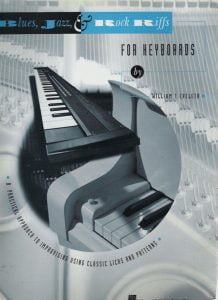 |
|
| William Gillock In Old Vienna Musescore File.mscz | ||
| William Gillock Valse Etude In Romantic Style Musescore File.mscz | ||
| William Joseph – Within (Songbook) (William Joseph) |
 |
William Joseph – Within (Songbook) (William Joseph) |
| William Robinson – My Girl | ||
| William Russo Composing Music A New Approach (ebook) |
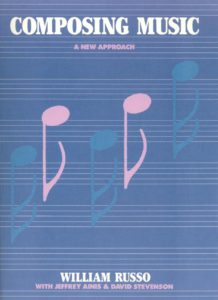 |
|
| Willie Dixon Preacher Of The Blues (2011) Mitsutoshi Inaba (Book) Biography |
 |
|
| Willie Fugal S Blues Piano transcription |
 |
|
| Willie Nelson – Always on My Mind Sheet Music |
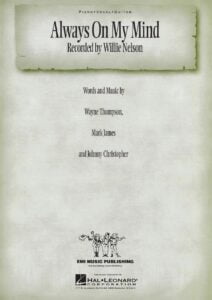 |
|
| Willie Nelson – On My Mind | ||
| Willie The Lion Smith – Finger Buster transcription |
 |
|
| Willie The Lion Smith Echo of Spring transcription |
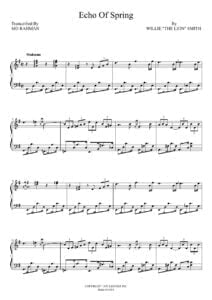 |
|
| Willow Weep For Me Words And Music By Ann Ronell 1932 Jazz Standard (Vintage sheet music) |
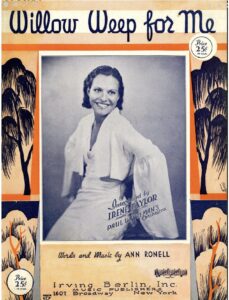 |
|
| Wim Mertens – American Minimal Music La Monte Young Terry Riley Steve Reich Philip Glass |
 |
Book La Monte Young Terry Riley Steve Reich Philip Glass |
| Wim Mertens – Close Cover | Wim Mertens – Close Cover | |
| Wim Mertens – Struggle For Pleasure | Wim Mertens – Struggle For Pleasure | |
| Wim Mertens – Time Passing |
 |
|
| Wim Mertens Humility |
 |
|
| Wim Mertens Lir |
 |
|
| Windham Hill piano sampler |
 |
Windham Hill piano sampler |
| Windy Whistle (Le Renard et l’Enfant OST) Alice Lewis | ||
| Wings (McCartney) – Greatest Hits |
 |
Wings sheet music |
| Winifred Atwell Album Of Rags No 1 Original arrangements Vintage songbook |
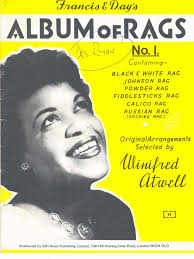 |
Winifred Atwell Album Of Rags No 1 Original arrangements Vintage songbook |
| Winifred Atwell Marguerite Monnot The Poor People Of Paris ( La Goualante Du Pauvre Jean) Piano Solo |
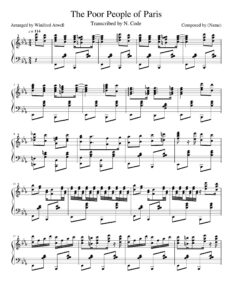 |
|
| Winnie The Pooh The Honey Tree Sheet Music (Disney) |
 |
Winnie The Pooh The Honey Tree Sheet Music (Disney) |
| Winter Sonata O.S.T. (Ryu) | ||
| Winter Wonderland Other Christmas Favorites Songbook Piano Vocal guitar Chords |
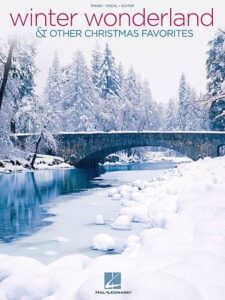 |
Winter Wonderland and Other Christmas Favorites Songbook Piano Vocal guitar Chords |
| Wish You Were Here – Pink Floyd (Musescore File).mscz | ||
| Within Temptation – Our Solemn Hour | ||
| Without you (Maria Carey) | ||
| Without You (Mariah Carey Piano Arr ) (Musescore File).mscz | ||
| Wiz Khalifa & Charlie Puth See You Again (Solo Piano) |
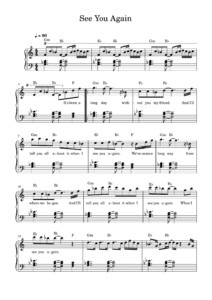 |
|
| Wolf Wagner Paraphrase Über Die Walküre |
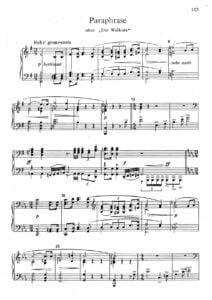 |
|
| Wolfe Richard Legit Professional Fake Book More Than 1010 Songs |
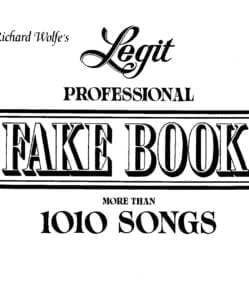 |
Wolfe Richard Legit Professional Fake Book More Than 1010 Songs |
| Wolfenzon – Stücke für Klavier | Wolfenzon – Stücke für Klavier | |
| Womack, Bobby – Midnight Mover My Autobiography The True Story of the Greatest Soul Singer in the World (Book) |
 |
|
| Woman in love (Barbra Streisand) | ||
| Women Of Pop Rock Songbook Twenty-Two Hot Hits for Easy Piano |
 |
Women Of Pop Rock Songbook Twenty-Two Hot Hits for Easy Piano |
| Wonderful Christmastime -Paul Mccartney (Wings) (Musescore File).mscz | ||
| Wonderful Life – Black (Easy Piano Solo Sheet Music) (Musescore File).mscz | ||
| Woody Allen – A propósito de nada (autobiografía)(2020) |
 |
|
| Woody Allen – Apropos of Nothing (2020) Autobiography | Woody Allen – Apropos of Nothing-Simon and Schuster (2020) Cover | |
| Woody Guthrie This Land Is Your Land (Easy and Intermediate Piano Solo) |
 |
|
| World Hits Of Jazz Standard |
 |
World Hits Of Jazz Standard |
| Wuthering Heights (Ryuichi Sakamoto) | ||
| Wynton Kelly – Autumn Leaves Solo transcription | Wynton Kelly – Autumn Leaves Solo transcription | |
| Wynton Kelly – Dark Eyes Solo Piano transcription |
 |
|
| Wynton Kelly – Dark Eyes Solo Piano Transcription (Musescore File).mscz | ||
| Wynton Kelly – Full transcriptions | Wynton Kelly – Full transcriptions | |
| Wynton Kelly – I Dig of You Solo transcription |
 |
|
| Wynton Kelly – If I should Love You Solo transcription |
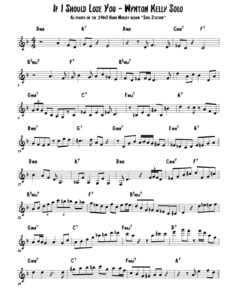 |
|
| Wynton Kelly – Jazz Piano Collection |
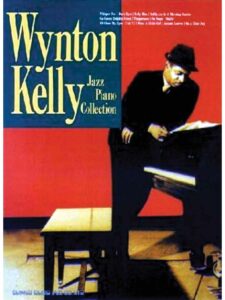 |
Wynton Kelly Piano Collection- |
| Wynton Kelly – Someday my prince will come (Piano solo) |
 |
|
| Wynton Marsalis Trumpet Genius Gourse, Leslie (Book) |
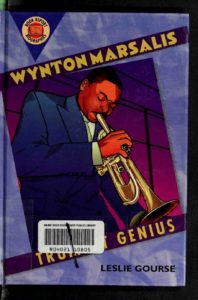 |
|
| Wynton Marsalis – Caravan (Solo) |
 |
|
| Wynton Marsalis – Darn That Dream (Solo) | Wynton Marsalis – Darn That Dream (Solo) | |
| Wynton Marsalis – Dealfayos Dillema (Solo) |
 |
|
| Wynton Marsalis – Standards (sheet music transcriptions) |
 |
Wynton Marsales – Standards (sheet music transcriptions) |
| Wynton Marsalis In The Court Of King Oliver (Trumpet and rhythm section) |
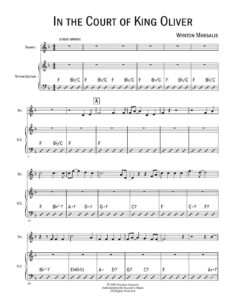 |
|
| Wynton Marsalis Omnibook For B Flat Instruments Transcribed exactly from his recorded solos |
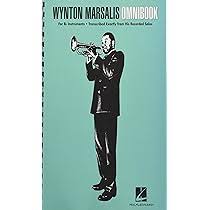 |
Wynton Marsalis Omnibook For B Flat Instruments Transcribed exactly from his recorded solos |
| Wynton Marsalis Struttin’ With Some Barbeque (Live) Wynton Marsalis’ Trumpet Solo |
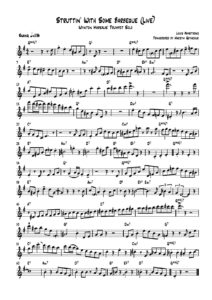 |
|
| Xenoblade Chronicles 2 Loneliness Kenji Hiramatsu | Xenoblade Chronicles Opening Theme Game sheet music | |
| Xenoblade Chronicles Opening Theme Game sheet music Yoko Shimomura |
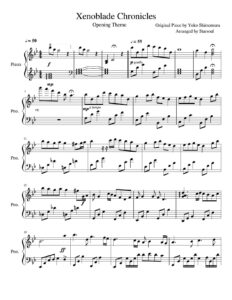 |
|
| Yamaha E443 Songbook digital keyboard PSR-E443 |
 |
|
| Yamaha Keyboard Songbook |
 |
Yamaha Keyboard Songbook |
| Yamaha Keyboard Songbook Song-Buch |
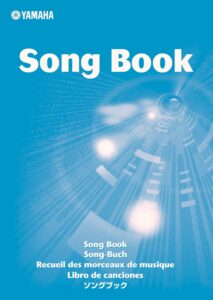 |
|
| Yamaha PSR E373 YPT-370 PSR-EW310 Song book |
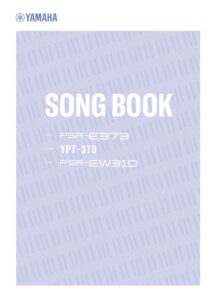 |
|
| Yamaha Song Book |
 |
Yamaha Song Book |
| Yamaha Song book |
 |
Yamaha Songbook |
| Yamaha Songbook |
 |
Yamaha-Songbook |
| Yamaha songbook 50 Piano Greats for the piano (Yamaha collection) |
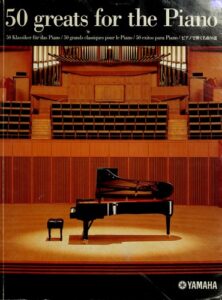 |
50 Piano Greats for the piano (Yamaha collection) |
| Yamaha Songbook Contemporary Vol. 1 |
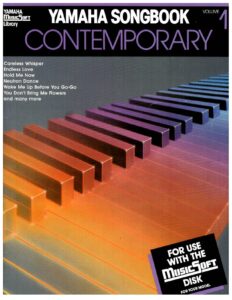 |
Yamaha Songbook Contemporary Vol. 1 |
| Yana Bobalik Mysterious Music Я.Бобалік Songbook |
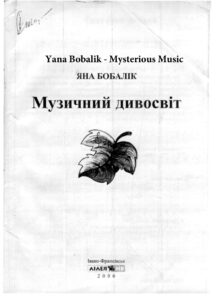 |
|
| Yana Bobalik Secret Music From Mysterious Music Я.Бобалік Таемна Музыка |
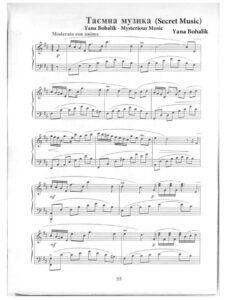 |
|
| Yann Tiersen Rue des Cascades (sheet music) | yann tiersen cascades sheet-music | |
| Yann Tiersen Mother’s Journey |
 |
|
| Yann Tiersen – Tabarly Sheet Music |
 |
|
| Yann Tiersen – Comptine Dun Autre ete | ||
| Yann Tiersen – La Dispute – Amelie Poulain | ||
| Yann Tiersen – La Valse d’Amelie Poulain | Yann Tiersen – La Valse Damelie | |
| Yann Tiersen – Le moulin – Amelie Poulain | Le Moulin – Amelie Poulain | |
| Yann Tiersen – Six pièces pour piano – Volume 2 – Amélie Poulain |
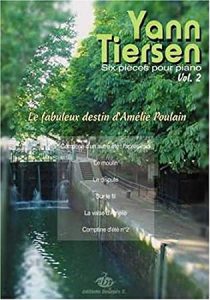 |
Yann Tiersen – Six pieces pour piano – Volume 2 – Music Sheet |
| Yann Tiersen – Summer 78 | ||
| Yann Tiersen – Sur Le Fil |
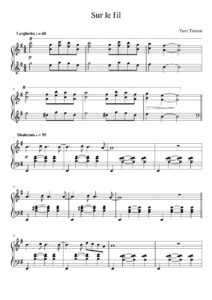 |
|
| Yann Tiersen – Pièces pour piano vol 1 et 2 + divers |
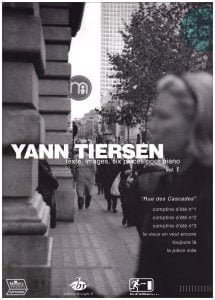 |
Yann Tiersen – pièces pour piano vol 1 et 2 + divers  |
| Yann Tiersen Eusa 2015 Songbook |
 |
|
| Yann Tiersen J’Y Suis Jamais Alle piano solo (Amélie) |
 |
|
| Yann Tiersen Onze Pièces Pour Piano |
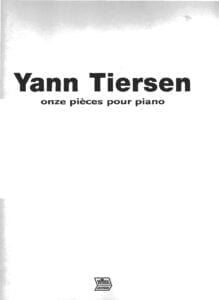 |
Yann Tiersen Onze Pièces Pour Piano |
| Yann Tiersen Partitions intégrales Piano Works 1993-2004 | Yann Tiersen Partitions intégrales Piano Works 1993-2004 | |
| Yann Tiersen Tabarly Complete Book For Piano |
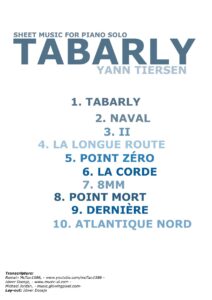 |
|
| Yanni In My Time (Piano Solos) Sheet Music |
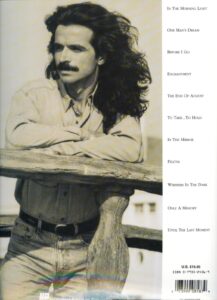 |
Yanni In my time piano solos |
| Yanni One Man’s Dream |
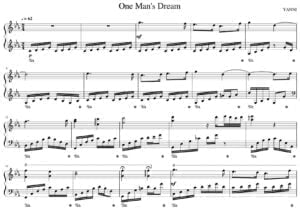 |
|
| Yanni – Per Piano (Piano book) |
 |
Yanni – Per Piano |
| Yanni – In The Morning Light | ||
| Yanni – Nostalgia | ||
| Yanni – One Man’s Dream (Musescore File).mscz | ||
| Yanni -The Best of |
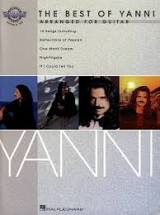 |
 |
| Yanni Ethnicity Book |
 |
Yanni Ethnicity Book |
| Yaron Herman – Hallelujah (Leonard Cohen) transcription |
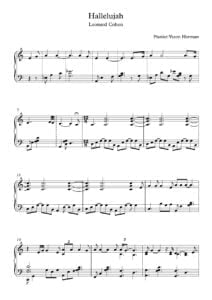 |
|
| Yashal (Elisa) | ||
| Yasuharu Takanashi – Naruto Shippuden OST – Loneliness |
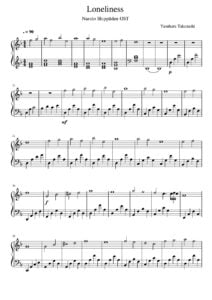 |
|
| Yedidia, Ronn Piano Sonata No 3 outcries (manuscrit) |
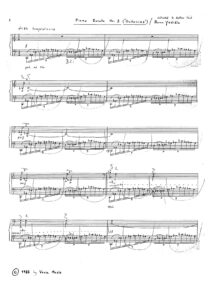 |
|
| Yehezkel Raz Ballerina Piano Solo sheet music |
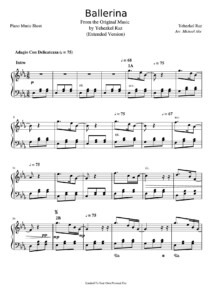 |
|
| YES Fragile |
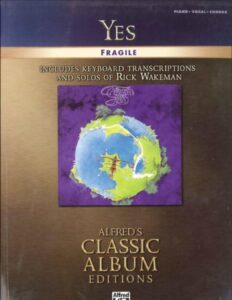 |
YES Fragile |
| YES – Complete Deluxe Edition |
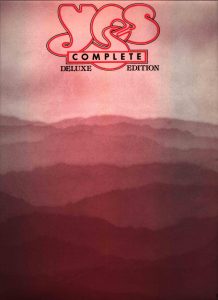 |
YES – Complete Deluxe Edition |
| Yes Close To The Edge The Story Of Yes (Book) |
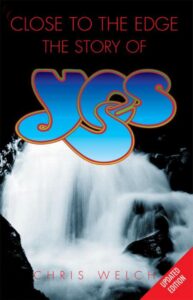 |
|
| Yes The Best Of Guitar Songbook with TABs |
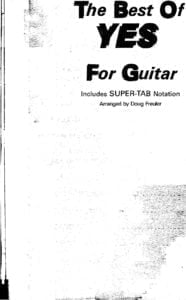 |
Yes The Best Of Guitar Songbook |
| Yesterday Piano Cello – Piano Sheet Music – Paul McCartney |
 |
|
| Yesterday Piano vocal guitar Songbook Featuring Music From the OST |
 |
|
| Yesterday The Beatles For Jazz Piano (Musescore File).mscz | ||
| Yesterday when I was young (Charles Aznavour) | ||
| Yimkin Law ( Et maintenant on va où OST) Racha Rizk | ||
| Yiruma – 27 May | ||
| Yiruma – Destiny Of Love | ||
| Yiruma – Dream | ||
| Yiruma – Dream A Little Dream Of Me | Yiruma – Dream A Little Dream Of Me | |
| Yiruma – Falling | ||
| Yiruma – First Love – River Flows In You | Yiruma – First Love – River Flows In You | |
| Yiruma – Gabriel | ||
| Yiruma – Kiss the Rain | Yiruma Kiss the rain |
